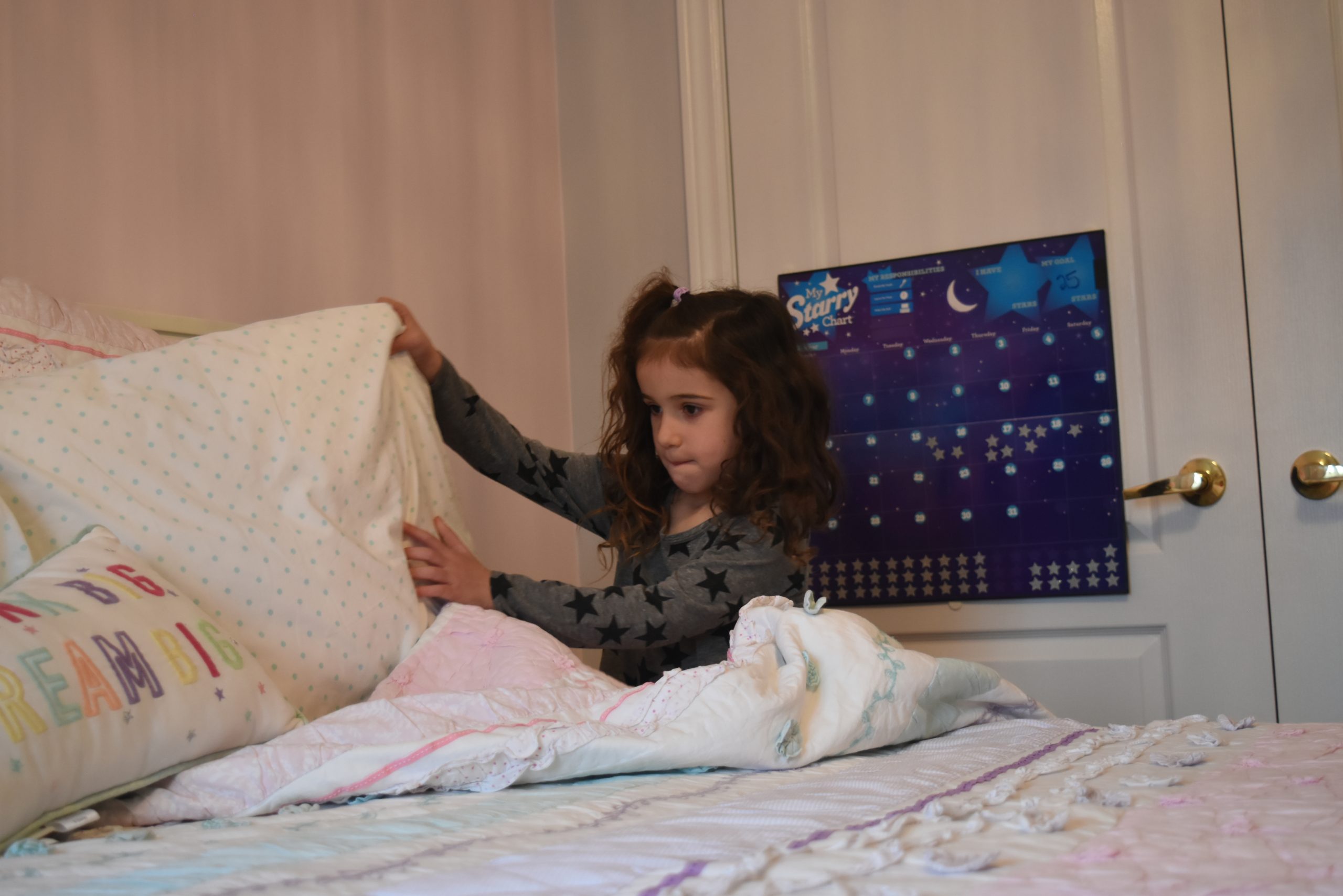
Routines can help kids to build crucial executive functioning skills

Kids are bundles of energy.
They learn new things at breakneck speed and display creativity in ways that many adults wish they could, sometimes.
But one thing they need help with is structure and organization.
That’s where a daily routine comes into play.
Routines can help kids to build crucial executive functioning skills that will enable them to capitalize on their talents and prepare them for adulthood.
This piece will take a look at the benefits of daily routines for kids and how chore charts can help kids establish new routines.
1. A Daily Routine Puts Bedtime Battles to Rest
Kids are little energizer bunnies and may do all they can to avoid hitting the sack.
Sometimes, kids don’t want to sleep when they’re told to because they don’t have an established bedtime routine.
Remember, the brain and the body’s circadian rhythm is highly responsive to repetition and highly sensitive to disorder.
In other words, when kids abide by a schedule and go to bed at a specific time, their brain and body will get the cue to “power down” at that time.
This takes experimentation and patience but it will do wonders for your kids’ sleep habits.
For example, a daily routine for bed may involve a bath then a bedtime story. Then, it’s lights out at 8:30 p.m. There are many ways you can go about putting the kids to sleep but the key is to do it consistently.
2. Daily Routines Reduce Parental Exhaustion
Have you thought and said, “Ugh. I’m wiped”, after coming home from a long day of work?
The feeling is amplified when you walk into a room full of toys. Or, bouncing kids who haven’t done their homework, unpacked their lunchbox or cleaned their rooms as you told them to.
Establishing a daily routine allows you to set these kinds of expectations.
The repetition really does help. When kids have a daily routine, they know that mom and dad have assigned a task that needs to be done on time.
When it’s not done, there is a response from mom or dad which shows this expectation wasn’t met. When it is done and done well, we can show a job well done.
This positive response is powerful, and when paired with repetition, can help build the daily routine and structure kids, and parents, crave!
3. A Daily Routine Helps Kids Gain Confidence & Independence
All kids face a bit of apprehension when given new chores.
This is normal. A routine, along with your supervision, will give them clear guidelines on how and when to complete these chores.
But over time, the routine will help establish a rhythm, and your kids will need less feedback and guidance to complete these chores.
The result?
More confidence and independence. This is important for kids who are approaching the pre-teen age range, where feelings of self-sufficiency contribute to higher self-worth.
4. A Daily Routine Helps Kids Establish Healthy Habits & Gain Important Housekeeping Skills
A chore chart is more than just a prop; it’s a means to encourage healthy habits.
Kids know that doing homework, cleaning their rooms or doing their laundry are good habits, but they forget that habits take practice and repetition.
A daily routine encourages them to do those chores and self-care habits repeatedly.
This allows them to practice essential skills and habits so that they become second-nature. When that happens, you won’t have to beg them to do these tasks over and over again.
More importantly, you can have the reassurance that your kids will grow up to be healthy and responsible adults.
5. A Daily Routine Keeps Kids Grounded During Times of Stress or Transition
Kids are not 100% care-free and they too can feel the effects of stress. Moving to a new neighbourhood and a new school is a form of major upheaval in a child’s life.
Unpleasant situations such as divorce or national emergencies such as the coronavirus (COVID-19) pandemic can also raise your child’s anxiety.
An established routine can reduce a great deal of stress.
True, it won’t resolve the underlying situation or events that originally triggers the anxiety. But daily routines help kids to find a sense of stability and calm when life gets chaotic.
6. A Daily Routine Will Help Kids Develop Personal Rituals & Interests
Never underestimate the power of a ritual.
Rituals fuel creativity, increase focus and reduce anxiety for kids and adults. Of course, for kids to experience these benefits, the ritual has to become a regular part of their lives. A daily routine allows kids to schedule times for them to carry out those rituals, in whatever form they may assume.
7. A Daily Routine Can Helps Kids Live Up to & Set Expectations
Expectations play a crucial role in child development.
They help kids learn that there are “rules” and that there are rewards and consequences for following or ignoring those rules.
They also reduce the need for you to remind kids that it’s time to take a bath or do their homework or take out the trash.
Routines can reinforce the concept of expectations.
When kids see a chore chart with activity stickers, for example, they may think to themselves “mum/dad is counting on me to do this.” Whether they do it or not is another story, but at least they will be cognizant of the responsibility.
As they grow up, they will likely appreciate the impact of expectations, and will soon start to set standards for themselves.
Tips to Make Daily Routines Simple for Kids of All Ages
Establishing a daily routine can be tricky to execute for various reasons. You may have kids with more rigid personalities, special needs or who are at ages where establishing certain routines may be inappropriate.
Regardless of these challenges, you can still create a daily routine for your kids that helps them stay on top of their responsibilities.
Making Routines Less of a Chore
- Start with the essentials – Meals, bedtime activities, school prep – these are necessities already. Instead of adding new chores right away, add some structure to the things your kids already do. This will introduce them into a daily routine without it feeling like a shock.
- On a chore chart, you can start with simple activity stickers related to mealtimes (ie. wash your hands, set the table) or bedtime (ie. brush your teeth).
- Give it time – It’s important to remember that habits take time to become habits. Try giving a new routine at least a month before adding anything new.
- Ease them into it – After your kids have developed a habit of doing basic tasks, you can sprinkle in a few new ones here and there.
- For example, that could be washing their dishes after dinner or reading before bed to help ease them into a restful sleep.
- Keep it flexible – Once your kids get to this step, you can start to add more challenging tasks. If you have a chore chart, you can start to add stickers that pertain to folding laundry, watering houseplants and more. But also be sure to vary things up a bit. While a daily routine is beneficial to your child’s development, you should make them flexible to accommodate unforeseen occurrences.
- Adjust where necessary – Eventually, you will start to see patterns in terms of what habits are working or not working for your kids. You can add rewards at this point. Also, reconsider the tasks that might no longer be appropriate for your child or that your child should start doing.
Fitting a Daily Routine in Your Kids’ Lives
It’s not easy getting your kids to adhere to a daily routine.
It takes time and effort.
However, routines are so impactful for children and can provide them with a level of organization, care and responsibility; skills they will keep into adulthood.
These fundamentals are so important and My Starry Chart is a way to track and maintain routine in all types of kids.
From the already conscientious child to little kids that need a bit more attention, a visual representation is the best way to show them what they are responsible for around the home, and in their own lives.
From making the bed to taking care of the family dog, this routine trickles up into caring for the outcome of following a household routine.
Kids can keep pace. All it takes is a nudge from mom or dad, and My Starry Chart to help (both of you) keep the routine going day by day.
